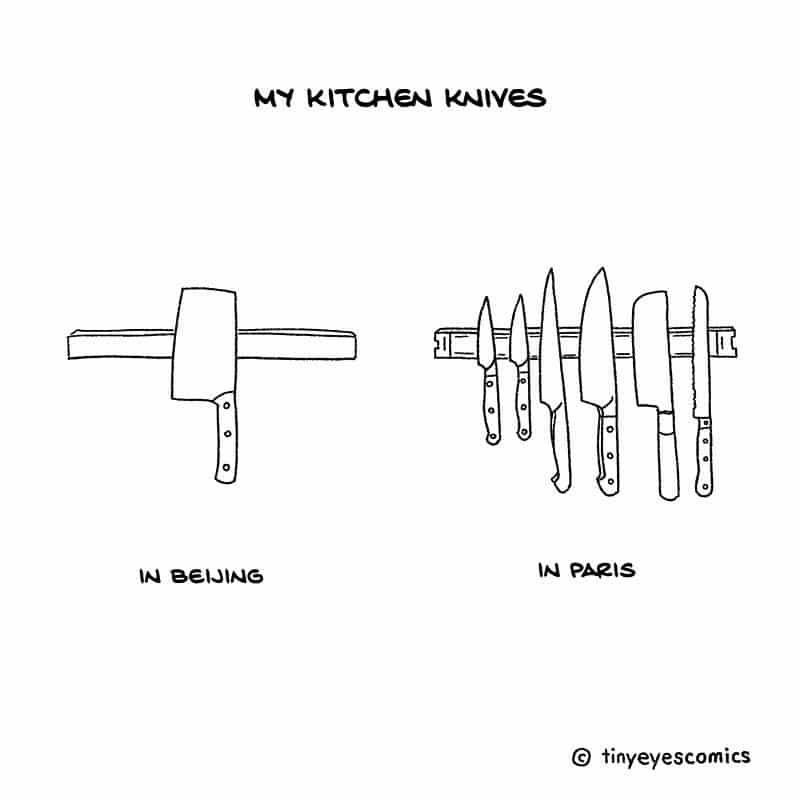Fuchsia Dunlop’s Invitation to a Banquet is one of those books popular in yuppie circles that I’ve been hesitant to read, but I picked it up when I saw Dan Wang recommend it in his 2023 letter.
I learned a few fun bits of history, but I wouldn’t go so far as to say I recommend it ¯\_(ツ)_/¯
Notes and quotes…
I love this bit about chopping and how it “speaks of the care and dedication of the chef, his attention to detail, his respect for his craft.”
These days, I notice when a dish is properly cut, when the slivers of pork are fine and even, when the scattering of ginger is like a galaxy of tiny, identical cubes, when the curled pieces of squid are cross-hatched just so. I notice when the pieces of radish in a beef stew are cut to a similar shape and size as the meat. A dish that is evenly cut is more pleasing aesthetically, more harmonious. It is also, almost invariably, better cooked, especially with rapid stir-fries, because only if the food is cut uniformly into slices, dice or slivers will all the pieces reach their peak of perfection at the same time.
A dish that is beautifully cut speaks of the care and dedication of the chef, his attention to detail, his respect for his craft.
I love this comparison of the Chinese and French cooking tool kits:
2015 What is most stunning about Chinese cuisine is the simplicity of the equipment used to generate this complex and extraordinary range of techniques. Even in professional kitchens, most food is prepared using little more than a Chinese cleaver and a wooden board (with a heavier cleaver for chopping through bones), a wok, a scoop or ladle, a strainer and a steamer. Each tool has multiple uses: the chef’s ladle, for example, is used for transferring oil or liquid, for stir-frying, for mixing sauces and, in Shanghai, as a mould for making tiny omelettes that will later serve as dumpling wrappers. It’s a striking contrast to French cookery, with its hefty batterie de cuisine, encompassing multiple knives, moulds and pans. The Paris-based Chinese graphic designer Siyu Cao sums this distinction up perfectly with a pair of drawings entitled ‘My Kitchen Knives’: the first one, labelled ‘In Beijing’, depicts a single Chinese cleaver hanging on a knife rack; the second, labelled ‘In Paris’, depicts a row of six knives of different shapes and sizes.1

“Food for the Ears is simply about the devoted pursuit of celebrity. The insatiable desire for the cachet of expensive ingredients, boastfully presented to guests…” – rang very true to how my own ideas about food have changed over the years.
More and more, I find myself wanting simple but yummy food, looking for hole-in-the-wall restaurants with $2 doubles or tacos instead of big fancy multi-course meals.
2670 Eating modestly could be a pose and an expression of intellectual superiority. Like the modern English aristocrat who lives in a freezing country pile, wearing threadbare corduroy trousers and eating fish pie for supper, while looking down his nose at the nouveau riche footballer’s wife who eats sushi in Mayfair, Chinese gentlemen often expressed distaste for the crass excesses of less cultivated people. ‘As for those who flavour living creatures with Sichuan pepper, fragrances or rare delicacies,’ wrote the seventeenth-century epicure Gao Lian, contemptuously, ‘these are for high officials’ sumptuous dinners or for offerings to celestial beings. They are not for a mountain hermit like me; I make no record of them at all.’24 (Despite professing himself to be a ‘mountain hermit’, Gao Lian, it should be noted, lived in a luxurious house in Hangzhou with his own library, art collection and study.25)
In his cookbook, printed in 1792, Yuan Mei was excoriating in his comments on what he saw as vulgar eating habits, such as what he called ‘Food for the Ears’ (er can):
‘Food for the Ears’ is simply about the devoted pursuit of celebrity. The insatiable desire for the cachet of expensive ingredients, boastfully presented to guests: this is Food for the Ears rather than Food for the Mouth. Don’t people know that well seasoned tofu is far superior to bird’s nest, and indifferent seafood cannot match bamboo shoots and vegetables? I once referred to chicken, pork, fish and duck as heroes because each of them has its own essential flavour and unique, distinctive style. Sea cucumber and bird’s nest, however, are crude, vulgar fellows, utterly devoid of character and only able to sponge off the livelihoods of others.
- Read Invitation to a Banquet by Fuchsia Dunlop